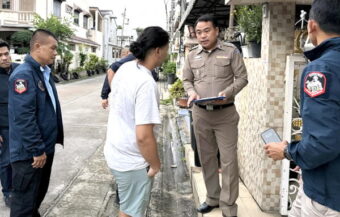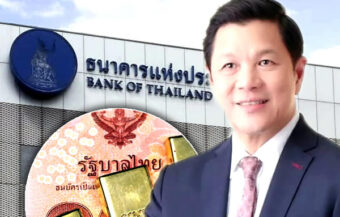Toddler hospitalised 24 hours after eating cannabis gummies sparks nationwide crackdown as Public Health Minister vows to curb illegal marijuana edibles slipping into homes, schools and parties amid rising youth cannabis use and safety fears in Thailand.
Just days after Public Health Minister Somsak Thepsuthin vowed to rein in Thailand’s out-of-control cannabis market, he’s launched another sweeping crackdown. The trigger? A two-year-old girl in Chiang Mai, hospitalised after eating cannabis-laced gummies at a birthday party. She collapsed at school the next day—drowsy, disoriented and slipping into unconsciousness. Doctors admitted her twice. At one point, she was unresponsive for 24 hours.

The case has sparked national outrage and renewed fears that cannabis proliferation is spiralling out of control. This isn’t an isolated incident—it’s part of a disturbing trend. Cannabis-infused snacks are slipping into homes, parties and schools.
Somsak says enough is enough. He’s now targeting illegal cannabis edibles and moving to outlaw recreational use altogether—even for adults. The message is clear: cannabis in Thailand was meant for medicine, not for parties, candy jars or school lunches.
Minister of Public Health Somsak orders crackdown after toddler hospitalised from cannabis-infused gummies
The Ministry of Public Health has ordered a nationwide crackdown on illegal cannabis-laced products. This follows a serious health incident involving a two-year-old girl who consumed cannabis-infused gummy bears. As a result, she was hospitalised twice in a single week.
On July 6, 2025, Public Health Minister Somsak Thepsuthin addressed the media.
He expressed deep concern over the incident and the broader issue of youth accessing cannabis unintentionally.
According to Mr. Somsak, this event reinforces long-standing worries about cannabis in consumer products. Therefore, he instructed immediate nationwide action through the Food and Drug Administration (FDA) and Provincial Public Health Offices (PPHOs).
All regional public health offices are now directed to inspect shops, markets and other sales points. They must look for cannabis-infused products that violate existing laws and safety standards. Officials have full authority to arrest, fine or refer violators to police.
Producers and sellers of cannabis products exceeding legal THC limits face heavy fines and possible jail time
Cannabis products that exceed legal THC limits will be treated as harmful or impure food.
Therefore, producers or sellers may face legal charges under the Food Act. They could receive fines, jail time, or both, depending on the offence.
If food products contain cannabis but lack labels or permits, the penalty is severe. Offenders may face fines up to ฿30,000 or imprisonment for up to three years.
Moreover, if the cannabis extract is found to exceed THC limits, the penalty is also robust. In that case, the offence carries a prison sentence of up to two years and a ฿20,000 fine.
Additionally, the Ministry will target shops selling cannabis directly to consumers. The Department of Thai Traditional and Alternative Medicine will lead these inspections weekly. They will work in coordination with local police forces in both central and rural areas.
Shops found operating without a license will be prosecuted immediately. They face up to one year in jail or a ฿20,000 fine, or both. Meanwhile, those with licenses who break conditions may have their licenses suspended or revoked.
Chiang Mai toddler’s cannabis poisoning sparks national crackdown and public warnings from father
This national sweep was prompted by a case this week in Chiang Mai Province. A 2-year-6-month-old girl was rushed to hospital after eating around ten cannabis-laced gummy bears.
The girl’s father posted about the incident online to warn others. According to him, the event began with a report from the child’s schoolteacher.
The teacher noticed the child appeared unusually drowsy. She had half-closed eyes and refused to eat her lunch. Concerned, the school called the girl’s uncle, who quickly brought her to the hospital.
Initially, doctors could not determine what caused her symptoms. However, after speaking with family members, the source was uncovered.
A few days earlier, the family had hosted a birthday party for the child’s uncle. Two guests brought cannabis-infused gummy bears and left them at the house. The family later realised that the child may have eaten them by mistake.
Girl diagnosed with acute cannabis intoxication after gummy ingestion; father demands compensation
After informing the hospital, doctors diagnosed the girl with acute cannabis intoxication and sinusitis. She remained unconscious for 24 hours. Following treatment, she was discharged.
However, she was readmitted only hours later with a high fever and persistent hallucinations.
The girl’s father filed an official complaint with the Hang Dong Police Station. He submitted two leftover gummies as evidence and is now demanding compensation from those responsible.
He claims the medical costs have already exceeded ฿50,000. Insurance refused to cover the expenses because the case involves narcotics. He also expressed concern about potential long-term effects on his daughter’s brain.
This case illustrates a growing danger: children accidentally consuming cannabis-infused products. Therefore, Minister Somsak has taken a firm stance. He emphasised that cannabis should only be used for certified medical purposes.
“Today, we must all work together to report these dangerous products,” Mr. Somsak said.
He highlighted the importance of public cooperation in identifying and eliminating illegal cannabis items.
Youth cannabis use surges tenfold in two years, raising mental health concerns and calls for stronger controls
In addition, he referred to national data that signals a worrying trend. According to a survey by the Department of Psychiatry at Chulalongkorn University, cannabis use among Thai youth is rising.
In 2020, only 1–2% of youth aged 18–19 reported smoking cannabis. However, by 2022, the number had surged to 9.7%. That is a tenfold increase in just two years.
Mr. Somsak warned that the social and mental health impacts of this trend could be severe. Therefore, stronger regulation and enforcement are essential.
The Ministry has now issued specific guidance to enforcement officers. First, all cannabis-infused food must be clearly labelled and approved by authorities. Second, cannabis extracts must not exceed legally defined THC content levels. Finally, sales to minors or indirect access through food must be strictly prevented.
In support of this campaign, the Ministry is urging public participation. Consumers who suspect they have encountered unsafe cannabis products can report them. Complaints can be made through the FDA hotline at 1556. Reports can also be filed with local health offices or the Department of Thai Traditional and Alternative Medicine.
Inspection teams to increase visits to markets and shops, with education campaigns on cannabis risks for children
Furthermore, inspection teams will increase their visits to food markets, street vendors, and retail shops. Officers will carry THC testing kits and documentation tools during inspections.
If any product is found in violation, action will be taken on the spot.
Additionally, educational campaigns will accompany enforcement measures. The Ministry plans to inform parents, schools, and communities about cannabis risks. Workshops and media messages will focus on preventing children from unknowingly consuming cannabis products.
Experts say cannabis in edible form poses greater risks to children. Because the drug is masked by sugar or flavouring, children are more likely to eat large quantities. Ingested cannabis also takes longer to metabolise, which can delay emergency treatment.
For this reason, Mr. Somsak emphasised the urgency of removing such products from the market.
“We cannot wait for another child to fall ill,” he said. “Cannabis for recreational use remains illegal. For medical use, we have strict conditions.”
Cannabis or marijuana again going underground on November 11 2025 after minister’s order on Monday
Bhumjaithai Party lays down the gauntlet on weed. Calls for passage of its original 2022 control law
Cannabis ghost back to life after finishing quest to Chiang Mai. Piya reclaimed his life from the drug
This campaign marks one of the most aggressive government responses since cannabis was partially decriminalised. Although the law allows cannabis for health and research purposes, it prohibits unsafe and unregulated use.
Nevertheless, some businesses have used legal grey areas to sell cannabis in snacks and beverages. This enforcement drive aims to close those gaps. According to the Ministry, the goal is not to reverse legalisation, but to enforce limits. Cannabis will remain a tool for medicine—not a risk for children.
Join the Thai News forum, follow Thai Examiner on Facebook here
Receive all our stories as they come out on Telegram here
Follow Thai Examiner here
Further reading:
Cannabis or marijuana again going underground on November 11 2025 after minister’s order on Monday
Bhumjaithai Party lays down the gauntlet on weed. Calls for passage of its original 2022 control law
Health Minister Somsak launches regulatory blitz to outlaw non-medical cannabis use within 40 days
Outbound cannabis smuggling smashed by Chiang Mai police. Europe and London presently targeted
Buriram cannabis factory raided for illegal Vietnamese staff as drugs czar declares a new regime
UK ambassador meets top Thai officials to further plans to rein in cannabis as smuggling surges
UK holiday maker to Thailand lands in Heathrow Airport London with £1 million worth of cannabis


















